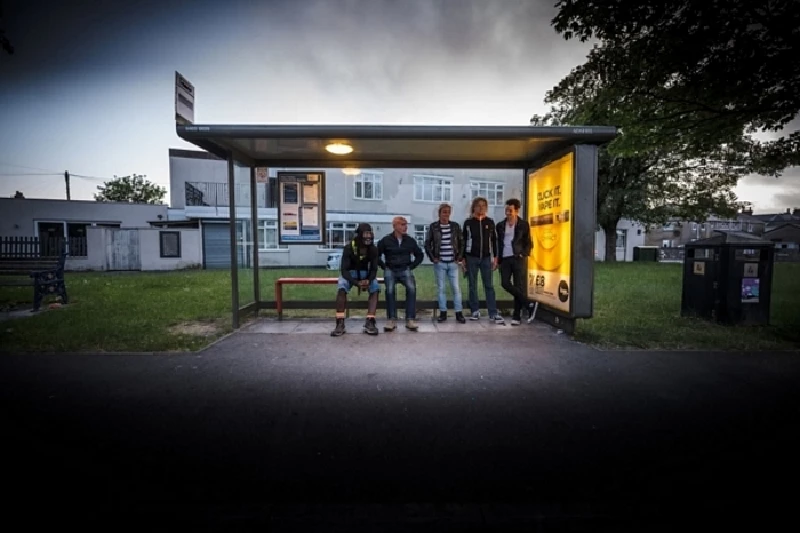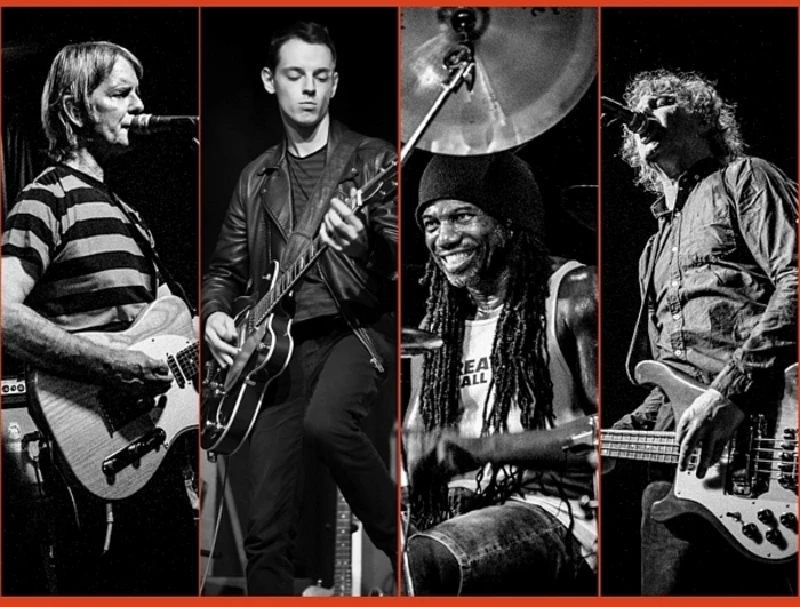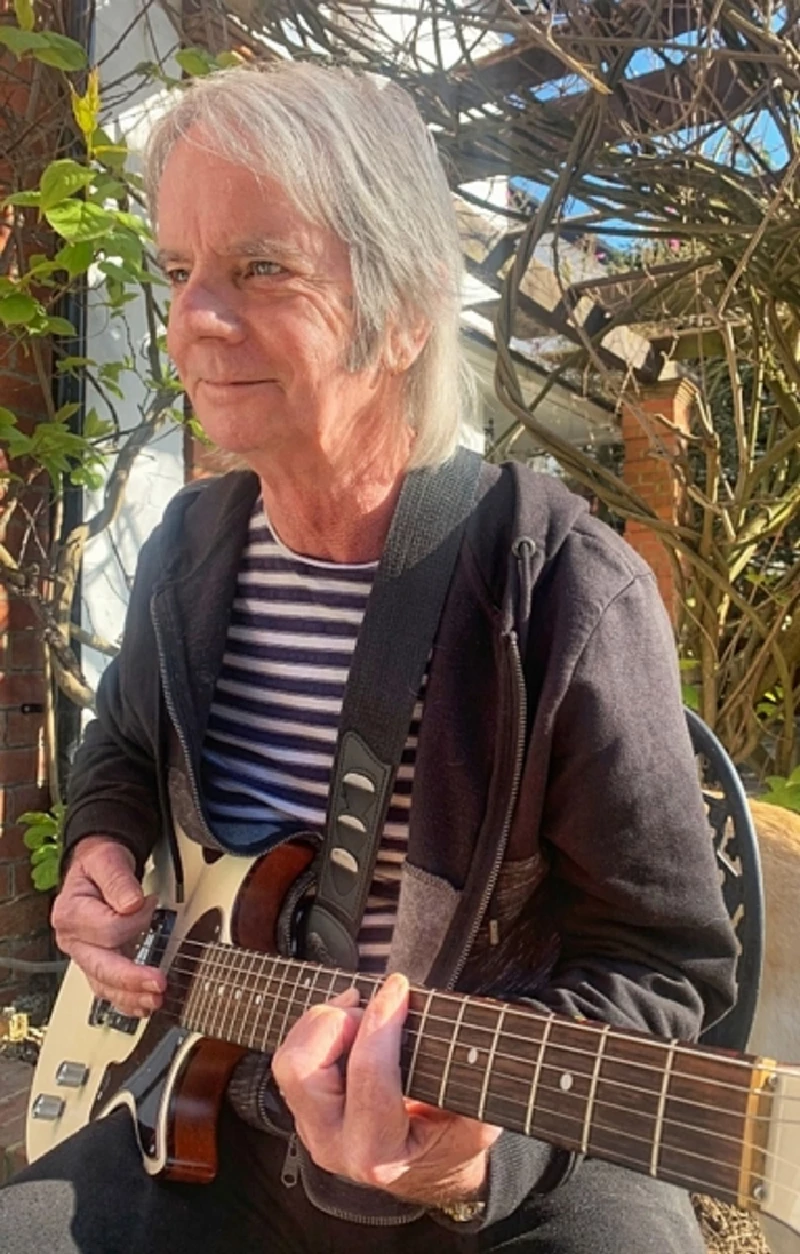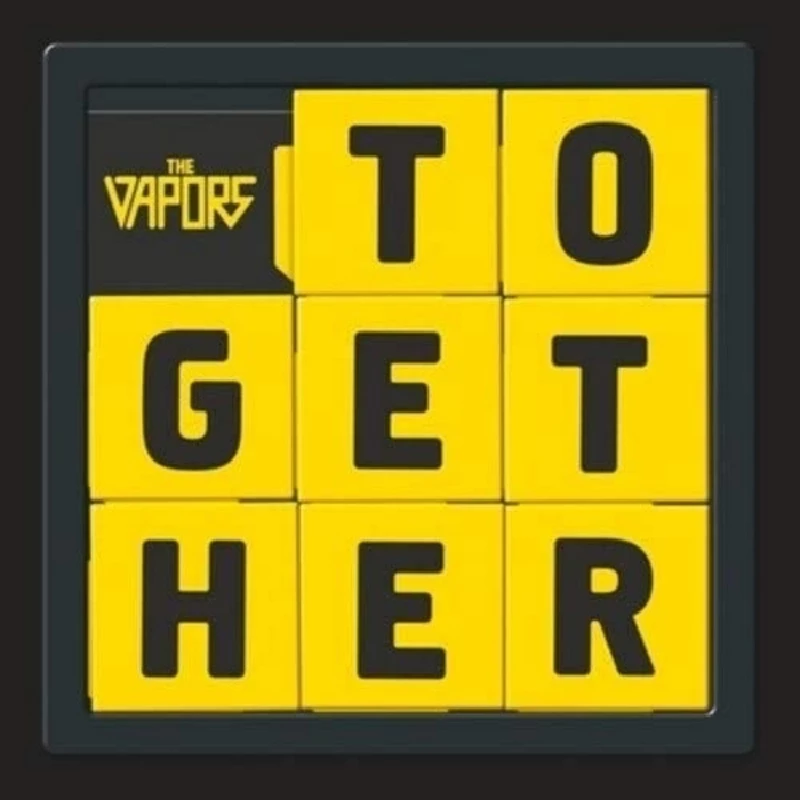Vapors - Interview
by John Clarkson
published: 27 / 5 / 2020

intro
The Vapors' vocalist and guitarist David Fenton speaks to John Clarkson about his band's massive success with their 1980 second single 'Turning Japanese', their reformation and 'Together', their first album in nearly forty years.
Of all the reformations in recent years there have been after an absence of 34 years few as surprising as that of the Guildford new wave/power pop outfit the Vapors. The Vapors had a massive no. 3 hit with their second single ‘Turning Japanese’ in early 1980, but, despite releasing two albums ‘New Clear Days’ (1980) and ‘Magnets’ (1981), were unable to sustain their early success and broke up in late 1981 without having another chart hit. The group finally reformed in early 2016 with three of its original membersve , David Fenton (lead vocals, rhythm guitar), Edward Bazalgette (lead guitar) and Steve Smith (bass), still in its line-up. The reformed Vapors also features Fenton’s son Daniel on guitar and Michael Bowes on drums. Now they have released their first album in forty years, ‘Together’, which was produced by Steve Levene (Culture Club, The Clash). It combines the Vapors’ trademark catchy riffs and poppy mee lodies over twelve songs. The brooding ‘Girl From the Factory’ looks at the seeming sudden suicide of a girl and the guilt of the man who was out with her the night before and was one of the last people to see her. ‘I Don’t Remember’ looks humorously at the issue of aging, and the title track, ‘Crazy’ and ‘These Tears’ are all classic love songs. Pennyblackmusic spoke to David Fenton about the Vapors’ comeback and ‘Together.. PB: Why did you decide to reform after such a long absence? DF: I took early retirement in 2016 and I was looking around to see what I could do to keep busy, so I rang the guys in the band up and two out of three were willing to give it a go. PB: You started out again by making a spontaneous performance at the Half Moon in Putney in London... DF: Yeah, that was Polyfest, Poly Styrene’s annual memorial gig. Steve was already playing it with his other band the Shakespearos,so we used their drummer and Ed played guitar and I just sang. We got up, did ‘Turning Japanese’ and got off. There was a video which got about 12,000 hits. PB: How long after that did you make the decision to reform? DF: We already had made the decision to reform. We met up in January of February 2016 and we talked about it then. Poly Fest was in May, but it and the reaction we got from it gave us another lever to get back together. PB: You apparently tried to get back together before? DF: Yeah, in about 2001. The main problem was that we were living in different countries. Ed was working for the BBC at the time editing and directing, especially for the ‘Holiday’ programme which took him abroad a lot, so there was difficulty even in getting rehearsals together. PB: Ed has been replaced at a lot of Vapors shows by your son Daniel. Why is that? DF: Right from the start Ed said that his directing career took priority but he would try to fit in as much Vapors work as possible. That wasn’t too difficult at first. We just did four gigs when we started out again in October and November of 2016, so he could fit that in easily but when we started touring properly it became more difficult to incorporate him. My son Daniel steps in when Ed can’t make it. They both appear on ‘Together‘. PB: Did you keep writing during the years that you were away from music? DF: Yeah, but I was only away from the beginning of the 1990s. Prior to that and after the Vapors finished I played in various other bands with various other people around London. I didn’t leave music completely until around about 1994. I had qualified as a solicitor in ‘77, and I went back to doing law full-time again. I tried to get into the music business in ’78. I thought if I don’t do it now I never will, so I gave myself a year to get a record deal and fortunately we did get one in ’79. From ’79 to the early 1990s I was doing music, and from the early ‘90s to 2016 I was doing law, and now I am back doing music again. PB: You apparently had a shortlist of about twenty songs to choose from for the new album. DF: Yeah, that’s right. I had written them all since we reformed. We all voted for them, the five of us in the band and Steve Levene the producer. We gave them marks out of ten and then totted up the top twelve and then recorded them. PB: What do you think Steve Levene brought to the album? DF: Once you explain to him or get over to him what sound you want, he is brilliant at getting the right sound. He will say, “This needs a Stratocaster with a Fender amp” or “It needs a special effect on this one.” He is amazing at just getting the right thing at the right time. PB: How long did the album take to record? DF: it was quite short. We did about six days on the back tracks, another six on vocals and overdubs and another six on mixing. It was eighteen days in all. PB: ‘Girl from the Factory’ is about suicide. What inspired that song? DF: It is not something that I have experienced myself, but I have talked to people who have known people that have committed suicide. It is such a horrible thing. The person who is still here is left with memories of what happened, and asking, “Is there anything that I could do to stop it” It was that sort of shock I was trying to capture in that song. It is not a nice subject, but i tend to do that quite a lot, write very poppy songs about dark situations. PB: What is ‘I Don’t Remember’ about? DF: That is about me. My memory is going. Although the songs are written by me generally and all the lyrics are by me I can’t remember them. The audience are singing along, and I am going, “What’s next?” You have got to laugh about it, and that one is more humorous. I try and write the songs at three different levels. Some of the songs are clearly about boyfriend/girlfriend. Other songs such as ‘I Don’t Remember’ are about the band and its fans, and others are darker. PB: ‘New Clear Days’ and ‘’Magnets’ both stand up really well despite being forty years old. Their subjects include nuclear weapons, environmental issues, mental health and political apathy. Do you think that is because its themes remain as topical today as they were back then? DF: I guess so. Yeah. I think that the songs, however. stand up as songs as well. I don’t think that it is down necessarily to what a song is about that makes it stand up. It is down to the music and the rest of the band really. When we started up again in 2016, I thought that there would be loads of songs that I didn’t want to play, that wouldn’t stand up but in fact we have played most of them since we reformed. PB: Things happened very quickly for the Vapors first time around. You signed to United Artists and had a massive hit with ‘Turning Japanese’ within six months. How difficult was it dealing with that sudden level of fame? DF: It was a shock. but before that we had done some dates with The Jam in November/Decemebr 1979, and that had been a shock too going overnight from playing pubs with twenty people in to 2,000 seaters. It was amazing. When ‘Turning Japanese’ came out, I was woken up by my radio alarm playing my own song. That had never happened to me before and it has never happened since (Laughs), but I started then realising how small the world is and how fast things can happen. PB: You were managed by Bruce Foxton from the Jam and Paul Weller’s dad John. How did that work? What was each of their roles? DF: Bruce saw us at a pub gig we were doing near Guildford. He chatted to us at the bar and said, “Do you want to do a couple of gigs?“ We were offered two gigs initially on The Jam’s’ Setting Sons’ tour in ’79, and they went well and John and Bruce offered to manage us jointly then. I don’t know how they resolved the work between them. but they were both our managers and they both helped. PB: Do you think that ‘Turning Japanese’ went against the band in some ways as you were never able to maintain that degree of success again? DF: It was difficult to follow it up but I don’t regret having a hit. It is better to have had one than not to have had one. PB: There was a story that ‘Turning Japanese’ was about masturbation. It wasn’t but you have often said that you were delighted that that story got out. Why? DF: I am sure that it sold more copies of the record. It definitely interested the Americans more, but it was written as a love song and it wasn’t until we went to America and we toured there that people started asking us about masturbation and if it was about that. Initially we said, “No,” but then to keep it more interesting we kept saying yes more rather than no (Laughs). PB: You broke up in late 1981. Why did you decide to split up? DF: Firstly EMI bought United Artists. United Artists was our label with Buzzcocks, the Gang of Four and Dr Feelgood. It was just brilliant. You could walk through the front door and talk to the Managing Director. There was an open door policy. It was really nice. EMI bought them out, and all the people that signed us up were made redundant, and there was nobody at EMI who liked us. They were much more interested in Duran Duran and Kate Bush and all the people they had signed. Secondly John and Bruce said, “Sorry, we can’t manage you anymore.” When we were at no. 3 with ‘Turning Japanese’ they were at no. 1 with ‘Going Underground’ and when they were touring Europe they were touring America. We hardly ever saw John or Bruce. So, they held their hands up and said, “We have taken off more than we expected,” so we lost our record label, we lost our management company and then we went into EMI on the day that the follow-up to ‘Turning Japanese’ was due out which was called ‘News at Ten’ and they had no idea when we talked to their chief A&R guy that it was out. They just weren’t interested. It was just a nightmare really. One of our follow-up singles we played it to the Head of A&R in the rehearsal studio and he said, “Fine.” The studio was booked for that weekend and he went back from that rehearsal and cancelled the studio time without even discussing it with us. It was easier to walk away from the whole mess rather than to try and resolve everything. That is what happened. That is why I left the band in late ’81. PB: You played over fifty gigs last year... DF: Yes, mainly because we toured with From The Jam on their ‘Setting Sons’ 40th Anniversary tour, and we also went to America and did twenty five gigs around America which was good. We then came back and did some more shows with From The Jam. This year was really booked up until a few weeks ago. We were going to be doing more shows with From The Jam, and that was going to be about twenty-five dates over March and April. They have all been postponed until the end of the year because of the current crisis. We were going to America, but we have just heard that that is off now, so we are going to go there in 2021 instead. Everything is up in the air. We were going to do our own tour over October, November, December for the 40th Anniversary of ‘New Clear Days’, but that looks doubtful too now. We were quite busy last year. We would have been busier this year, but it is all off now for the time being. PB: Is it true that you are now working on a fourth album? DF: I have got another twenty songs ready and raring to go for the fourth album. If we can’t play live. then maybe we can go back to the studio if we can find somewhere. PB: Thank you.
Band Links:-
http://www.thevapors.co.uk/https://www.facebook.com/TheVaporsOfficial
https://twitter.com/vaporsofficial
Play in YouTube:-
Picture Gallery:-



most viewed articles
current edition
Carl Ewens - David Bowie 1964 to 1982 On Track: Every Album, Every SongArmory Show - Interview with Richard Jobson
Bathers - Photoscapes 1
Colin Blunstone - Thalia Hall, Chicago, 16/7/2025
Visor Fest - Valencia, Spain, 26/9/2025...27/9/2025
Billie Eilish - O2 Arena, London, 10/7/2025
Robert Forster - Interview
Loft - Interview
John McKay - Interview
Editorial - July 2025
previous editions
Heavenly - P.U.N.K. Girl EPManic Street Preachers - (Gig of a Lifetime) Millennium Stadium, Cardiff, December 1999
Oasis - Oasis, Earl's Court, London, 1995
Beautiful South - Ten Songs That Made Me Love...
Trudie Myerscough-Harris - Interview
Pixies - Ten Songs That Made Me Love...
Simon Heavisides - Destiny Stopped Screaming: The Life and Times of Adrian Borland
Paul Clerehugh - Interview
Doris Brendel - Interview
Prolapse - Interview
most viewed reviews
current edition
Amy Macdonald - Is This What You've Been Waiting For?Sick Man of Europe - The Sick Man of Europe
Alice Cooper - The Revenge of Alice Cooper
Phew, Erika Kobayashi,, Dieter Moebius - Radium Girls
Davey Woodward - Mumbo in the Jumbo
Lucy Spraggan - Other Sides of the Moon
Blueboy - 2
Cynthia Erivo - I Forgive You
Philip Jeays - Victoria
Lapsley - I'm a Hurricane, I'm a Woman In Love
Pennyblackmusic Regular Contributors
Adrian Janes
Amanda J. Window
Andrew Twambley
Anthony Dhanendran
Benjamin Howarth
Cila Warncke
Daniel Cressey
Darren Aston
Dastardly
Dave Goodwin
Denzil Watson
Dominic B. Simpson
Eoghan Lyng
Fiona Hutchings
Harry Sherriff
Helen Tipping
Jamie Rowland
John Clarkson
Julie Cruickshank
Kimberly Bright
Lisa Torem
Maarten Schiethart